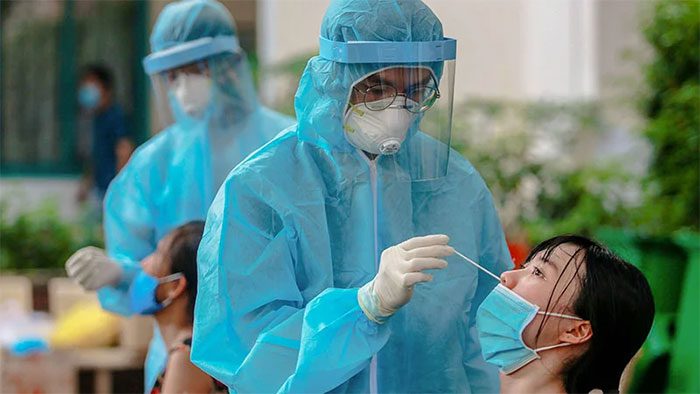Is there a risk of reinfection for individuals who have recently recovered from COVID-19 when coming into close contact with newly confirmed cases? Let’s hear the expert’s insights.
Reinfection Risk for Recently Recovered COVID-19 Patients
As the number of cases rises rapidly, many individuals who have recovered from COVID-19 find themselves returning to work and immediately coming into close contact with those who test positive. In this scenario, is there a risk of reinfection for these recently recovered patients?
Regarding this issue, Dr. Le Quang My from the Neurosurgery Department at Children’s Hospital 2 in Ho Chi Minh City stated that individuals who have recovered from COVID-19 will have immunity, but it is not lifelong immunity and does not protect the body against other variants.
For those who have just recovered, the likelihood of reinfection immediately afterward is very low. However, recently recovered individuals can still be at risk of reinfection when coming into contact with new COVID-19 cases, especially in close proximity (for example, sharing meals or conversing without wearing masks), although this risk is quite small.
Associate Professor Dr. Phung Nguyen The Nguyen, Head of the Pediatrics Department at the University of Medicine and Pharmacy in Ho Chi Minh City, shares a similar perspective. The doctor believes that for individuals who have recovered within the last month, the chance of reinfection is very low (under 2%). However, to prevent the spread of the virus, everyone should still limit direct contact. If contact is necessary, remember to wear masks, maintain distance, and wash hands frequently.
Currently, there are some cases where individuals have been reinfected within a month after recovery. According to medical experts, this is unlikely to occur with the same variant. The reason is that one month after contracting COVID-19, the immune system is typically strong enough to protect the body. However, it is not ruled out that a weakened immune system, other viruses, or new variants can lead to reinfection.
How Long After Recovery is There a Risk of Reinfection?
According to a statement from the World Health Organization (WHO) at the end of December 2021, reinfection with the SARS-CoV-2 virus more than once with the same or different strains in COVID-19 patients deemed recovered has been reported in many countries. WHO data indicates that approximately 2% of individuals who have had COVID-19 experience reinfection more than once.
Dr. Truong Huu Khanh, Permanent Vice President of the Ho Chi Minh City Infectious Diseases Association, states that reinfection with COVID-19 in a short period is entirely possible. The reason is that patients may be infected with two different variants. For example, someone who previously had the Delta variant can still be reinfected with COVID-19 if they encounter the Omicron variant, and vice versa.

Healthcare worker taking a COVID-19 test sample.
Typically, after recovering from COVID-19 for 1 to 2 months, individuals may have a risk of reinfection. The risk of reinfection increases after 3 months because, over time, the concentration of antibodies in the body decreases.
According to WHO, the risk of reinfection depends on various factors such as vaccination status or whether the individual previously had the disease but had a poor immune response.
How Can One Avoid the Risk of Reinfection with COVID-19?
Although individuals who have recovered from COVID-19 have antibodies to help combat the SARS-CoV-2 virus, the antibody levels can vary from person to person, depending on their physiology and underlying health conditions.
If the antibody levels are not strong enough and the recovered individual does not adhere to preventive measures when in contact with a new variant case, the risk of reinfection may arise.
Therefore, to minimize the risk of reinfection, everyone should adhere to the 5K principles; avoid touching their eyes, nose, and mouth, even after recovery.
Even if you are a recovered patient, you should still get vaccinated against COVID-19 as recommended by the Ministry of Health to enhance your body’s protection against the virus and avoid the possibility of reinfection.



















































